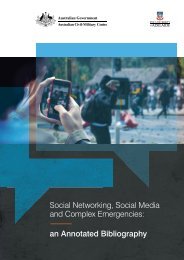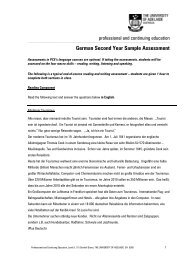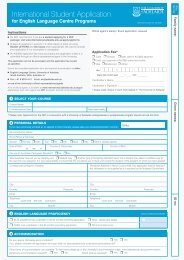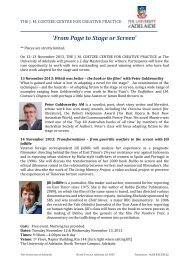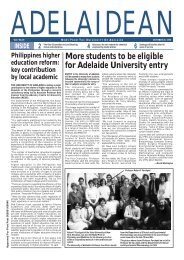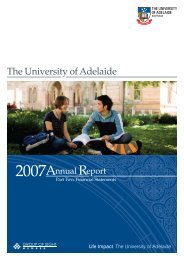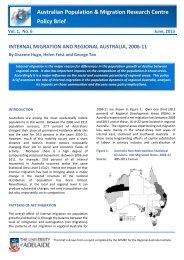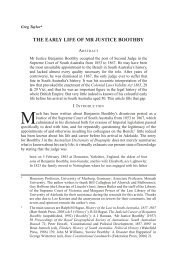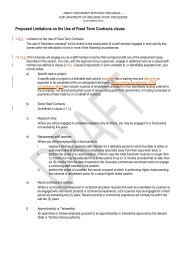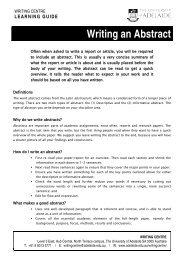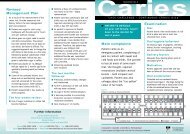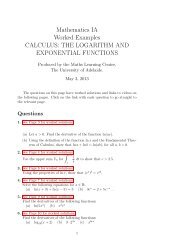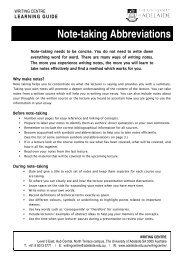Unbridling the Tongues of Women - The University of Adelaide
Unbridling the Tongues of Women - The University of Adelaide
Unbridling the Tongues of Women - The University of Adelaide
You also want an ePaper? Increase the reach of your titles
YUMPU automatically turns print PDFs into web optimized ePapers that Google loves.
<strong>Unbridling</strong> <strong>the</strong> tongues <strong>of</strong> women<br />
Mill’s article showed Spence, she said, ‘how democratic government could be<br />
made real, and safe, and progressive’. She saw in his account <strong>of</strong> Hare’s electoral system<br />
a way <strong>of</strong> at once safeguarding <strong>the</strong> right <strong>of</strong> minorities like <strong>the</strong> religious minority<br />
she had recently joined, and <strong>of</strong> preventing such bodies as <strong>the</strong> South Australian Political<br />
Association (which, earlier called <strong>the</strong> ‘Working Man’s Association’, had campaigned<br />
against continued immigration at public expense during <strong>the</strong> 1860 elections)<br />
from returning a parliament like that in Victoria, which Spence considered to be a<br />
bunch <strong>of</strong> incompetent demagogues. 11 Her perception electrified her:<br />
I read Mill’s article one Monday night, and wrote what was meant for a<br />
leader on Tuesday morning, and went to read it to my bro<strong>the</strong>r at breakfast<br />
time, and posted it forthwith. 12<br />
She sent it, as with so many o<strong>the</strong>r articles she had written under her bro<strong>the</strong>r’s name,<br />
to <strong>the</strong> Argus, but <strong>the</strong> Argus, which had kept up an abusive editorial commentary on<br />
<strong>the</strong> results <strong>of</strong> <strong>the</strong> 1859 elections in Victoria throughout August and September <strong>of</strong><br />
that year, never<strong>the</strong>less rejected her argument. <strong>The</strong>y were, <strong>the</strong>y told her, committed<br />
to <strong>the</strong> representation <strong>of</strong> majorities. 13 Rebuffed, Spence fell silent on <strong>the</strong> issue for a<br />
year or so.<br />
In 1861, <strong>the</strong> South Australian press and parliament debated yet ano<strong>the</strong>r electoral<br />
act amendment bill, <strong>the</strong> fourth since <strong>the</strong> first Act was passed. During those debates,<br />
Lavington Glyde MP <strong>of</strong>fered <strong>the</strong> legislature a muddled exposition <strong>of</strong> Thomas Hare’s<br />
scheme, without any success. 14 <strong>The</strong> Register discussed his proposals in a sub-leader,<br />
acknowledging <strong>the</strong> justice <strong>of</strong> <strong>the</strong> scheme, but objecting to its effects. 15 <strong>The</strong> following<br />
day, <strong>the</strong> paper printed a letter in which Spence supported <strong>the</strong> scheme, and a few days<br />
later it carried ano<strong>the</strong>r letter she had written refuting objections to Glyde’s proposals.<br />
16 Once again, her arguments, and Glyde’s, encountered only rejection. <strong>The</strong> bill<br />
to reorganise electoral districts and <strong>the</strong>ir numbers <strong>of</strong> representatives, a response to<br />
population shifts and <strong>the</strong> small turn-out at <strong>the</strong> 1860 elections, did only what it was<br />
designed to do. 17 However this time, Spence did not give up as easily as she had<br />
before. At her bro<strong>the</strong>r John’s suggestion, she wrote a pamphlet urging <strong>the</strong> adoption<br />
<strong>of</strong> Hare’s electoral system in South Australia. In preparing it she read Hare’s book,<br />
probably for <strong>the</strong> first time.<br />
Hare’s Treatise on <strong>the</strong> Election <strong>of</strong> Representatives was an expanded, reshaped version<br />
<strong>of</strong> a pamphlet called <strong>The</strong> Machinery <strong>of</strong> Representation which he had published<br />
after <strong>the</strong> 1857 general election in Britain. 18 It contained <strong>the</strong> detailed provisions <strong>of</strong><br />
124



